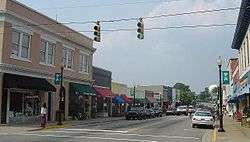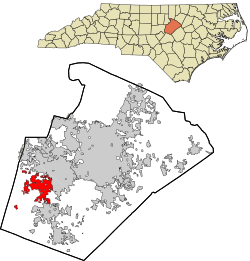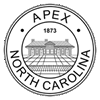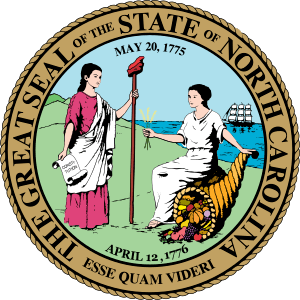Apex, North Carolina
| Apex, North Carolina | ||
|---|---|---|
| Town | ||
 The historic downtown district of Apex | ||
| ||
| Nickname(s): Peak City | ||
| Motto(s): "The Peak of Good Living" | ||
 Location in Wake County and the state of North Carolina. | ||
| Coordinates: 35°43′55″N 78°51′10″W / 35.73194°N 78.85278°WCoordinates: 35°43′55″N 78°51′10″W / 35.73194°N 78.85278°W | ||
| Country | United States | |
| State | North Carolina | |
| County | Wake | |
| Incorporated | 1873 | |
| Government | ||
| • Type | Council-Manager | |
| • Mayor | Lance Olive | |
| • Mayor Pro Tem | Nicole Dozier | |
| • Town Manager | Drew Havens | |
| • Town Attorney | Laurie Hohe | |
| Area | ||
| • Town | 20.84 sq mi (53.98 km2) | |
| Elevation | 499 ft (152 m) | |
| Population (2010) | ||
| • Town | 37,476 | |
| • Estimate (Jun. 30, 2018)[1] | 53,862 | |
| • Density | 1,800/sq mi (690/km2) | |
| • Metro | 1,302,946 | |
| Demonym(s) | Apexian or Apexer | |
| Time zone | UTC−5 (EST) | |
| • Summer (DST) | UTC−4 (EDT) | |
| ZIP codes | 27502, 27523, 27539 | |
| Area code(s) | 919, 984 | |
| FIPS code | 37-01520[2] | |
| GNIS feature ID | 1018834[3] | |
| Website | www.apexnc.org | |
Apex is a town in Wake County, North Carolina and a suburb of Raleigh, North Carolina. The U.S. Census Bureau estimates the town's population to be 43,907 as of July 1, 2014.[4]
Apex is located at 35°43′55″N 78°51′10″W / 35.731952°N 78.852878°W (35.731952, −78.852878).[5]
According to the United States Census Bureau, the town has a total area of 15.4 square miles (40 km2), of which, 15.2 square miles (39 km2) of it is land and 0.15 square miles (0.39 km2) of it (0.57%) is water.
Neighboring towns include Cary to the north and northeast, Holly Springs to the south, and Raleigh to the east and northeast.
History
The town of Apex was incorporated in 1873. According to the North Carolina History Project, the town was named for its location as the highest point on a portion of the Chatham Railroad which ultimately extends between Richmond, Virginia and Jacksonville, Florida.[6] According to a 1905 USGS publication on place names, the name refers to the highest point between Raleigh and the Deep River.[7]
Apex grew slowly through the succeeding decades, despite several devastating fires, including a June 12, 1911 conflagration which destroyed most of the downtown business district.[8] The town center was rebuilt and stands to this day, now one of the most intact railroad towns in the state. At the heart of town stands the Apex Union Depot, originally a passenger station for the Seaboard Air Line Railroad and later home to the locally supported Apex Community Library. The depot now houses the Apex Chamber of Commerce.
Apex suffered mild setbacks during the Depression-era, but growth began again in earnest in the 1950s. The town's proximity to North Carolina's Research Triangle Park spurred additional residential development, yet the town managed to preserve its small-town character. During the 1990s, the town's population quadrupled to over 20,000, placing new demands upon Apex's infrastructure.
Apex has continued to grow in recent years. A sizable shopping center was built at the intersection of Highway 55 and US 64, and several new neighborhoods have been built as the town grows toward the west.[9]
In October 2006, a chemical fire in an Apex waste processing facility forced much of the town to be temporarily evacuated.[10] There were few serious injuries, and residents were soon able to return home.[11]
In August 2015, TIME magazine ranked Apex #1 on its list of the nation's top places to live.[12] In July 2018, Realtor.com ranked Apex the #1 Fastest Growing Suburb in America.[13]
In addition to the Apex Union Depot, the Apex City Hall, Apex Historic District, Calvin Wray Lawrence House, and Utley-Council House are listed on the National Register of Historic Places.[14]
Government
Apex's Council-Manager form of government has a mayor and five council members (one of whom serves as Mayor pro tem) who are each elected at-large in staggered four-year terms. The town's attorney and manager serve at the pleasure of the council. All other staff report to the town manager and manage the town's day-to-day business.
The town is led by Mayor Lance Olive, elected in 2015. Nicole Dozier was selected by her peers to serve as Mayor Pro Tempore. The council members, in order of tenure are: Bill Jensen (1999), Nicole Dozier (2013), Wesley Moyer (2015), Brett Gantt (2017), and Audra Killingsworth (2017).[15]
In the North Carolina House of Representatives, Apex is represented by Nelson Dollar, Linda Hunt Williams, and Gale Adcock.
Demographics
| Historical population | |||
|---|---|---|---|
| Census | Pop. | %± | |
| 1880 | 228 | — | |
| 1890 | 269 | 18.0% | |
| 1900 | 349 | 29.7% | |
| 1910 | 681 | 95.1% | |
| 1920 | 926 | 36.0% | |
| 1930 | 863 | −6.8% | |
| 1940 | 977 | 13.2% | |
| 1950 | 1,065 | 9.0% | |
| 1960 | 1,368 | 28.5% | |
| 1970 | 2,192 | 60.2% | |
| 1980 | 2,847 | 29.9% | |
| 1990 | 4,968 | 74.5% | |
| 2000 | 20,212 | 306.8% | |
| 2010 | 37,476 | 85.4% | |
| Est. 2016 | 47,349 | [16] | 26.3% |
| U.S. Decennial Census | |||
As of the census of 2010, there were 37,476 people, 13,225 households, and 9,959 families residing in the town. The population density was 2,437.9 people per square mile. There were 13,922 housing units at an average density of 905.8 per square mile. The racial makeup of the town was 80% White, 8% African American, 7% Asian, 3% from other races, and 3% from two or more races. Hispanic or Latino of any race were 7% of the population.[17]
There were 13,225 total households in Apex in 2010. Of these, 9,959 (75%) were family households out of which 65% had children under the age of 18 living with them. 84% of the family households were married couples living together and 13% had a female householder with no husband present. There were 3,266 Nonfamily households in Apex comprising 25% of total households. 2,650 households were made up of individuals (20% of total households) and 4% had someone living alone who was 65 years of age or older. The average household size was 2.82 and the average family size was 3.31.
The town population was spread out with 33% under the age of 18, 5% from 18 to 24, 34% from 25 to 44, 22% from 45 to 64, and 6% who were 65 years of age or older. The median age was 34 years. For every 100 females, there were 95 males.
The median income (in 2013 dollars) for a household in the town was $89,475, and the median income for a family was $106,283. Males had a median income of $65,179 versus $48,022 for females. (2013 estimate[18]). The per capita income for the town was $34,979. About 2% of families and 3% of the population were below the poverty threshold (2013 estimate[19]).
Schools
- Apex Elementary School
- Apex Friendship High School
- Apex High School
- Apex Middle School
- Baucom Elementary
- Jordan Lake School of the Arts
- Laurel Park Elementary School
- Lufkin Road Middle School
- Middle Creek High School
- Olive Chapel Elementary
- Peace Montessori School
- Salem Elementary School
- Salem Middle School
- Scotts Ridge Elementary School
- St. Mary Magdalene Catholic School
- Thales Academy of Apex
- West Lake Elementary School
- West Lake Middle School
Transportation
Passenger
- Air: Raleigh-Durham International Airport is on I-40 approximately eight miles north of downtown Apex.
- Apex is not served directly by passenger trains. Amtrak serves the nearby municipalities of Cary and Raleigh.
- Local Bus: The Triangle Transit Authority operates buses that serve the region and connect to municipal bus systems in Raleigh, Durham , and Chapel Hill.
Roads
- The Apex Peakway is a loop road orbiting downtown Apex. The Peakway was conceived as a means to relieve traffic in the downtown area and provide a bypass for commuters traveling from one side of the town to the other. It is currently the only "peakway" in North Carolina, taking its name from Apex's town motto: "The Peak of Good Living." When finished, the Apex Peakway will be 6.01 miles (9.67 km) long; so far 5.09 miles (8.19 km) have been constructed.[20]
- The Triangle Expressway southwestern extension of I-540 is a toll road connecting to I-40, US 64, and US 1. This is currently an incomplete loop road around the greater Raleigh area.
- US 64 and U.S. 1 are both freeways in the Apex area. NC 55 travels through the center of town.
Bicycle and pedestrian
- U.S. Bicycle Route 1 routes through downtown Apex. Also, N.C. Bicycle Route #5 connects Apex to Wilmington and closely parallels the NCBC Randonneurs 600 kilometer brevet route.[21]
Top employers
According to the 2015 Comprehensive Financial Report for Apex, these were the town's top employers:[22]
| # | Employer | # of Employees |
|---|---|---|
| 1 | Wake County Public Schools | 1013 |
| 2 | EMC | 700 |
| 3 | Cooper Industries | 425 |
| 4 | Town of Apex | 364 |
| 5 | Target | 250 |
| 6 | ATI Industrial Automation | 220 |
| 7 | Bland Landscaping | 230 |
| 8 | Rex Healthcare | 160 |
| 9 | Walmart | 150 |
| 10 | Lowes Home Improvement | 150 |
Notable people
- Sio Moore, an American football linebacker for the Indianapolis Colts of the National Football League attended Apex High School.
Attractions
- North Carolina Railroad Museum & New Hope Valley Railway
- Halle Cultural Arts Center
- Apex Jazz Festival
- Knights Play Golf Center
- Peak City Grill & Bar
- Apex Farmers Market
- Beaver Creek Commons/Crossing
- All Booked Up
- Antiques on Salem Street
- The Rusty Bucket Furnishings & Accessories
- Peaktique Antique Festival every spring
Notable court cases
- Hilliard v. Apex Cabinet Co.: Supreme Court of North Carolina found in favor of the Plaintiff, an injured worker, remanding a workers' compensation claim to the North Carolina Industrial Commission, indicating that "the determination of whether a disability exists is a conclusion of law and that said conclusion must be based upon findings of fact supported by competent evidence." Hilliard v. Apex Cabinet Co., 290 S.E.2d 682 (1982).[23]
References
- ↑ "Apex Development Report". "Town of Apex Government". 2018-06-30.
- ↑ "American FactFinder". United States Census Bureau. Archived from the original on 2013-09-11. Retrieved 2008-01-31.
- ↑ "US Board on Geographic Names". United States Geological Survey. 2007-10-25. Retrieved 2008-01-31.
- ↑ "Annual Estimates of the Resident Population: April 1, 2010 to July 1, 2014". United States Census Bureau.
- ↑ "US Gazetteer files: 2010, 2000, and 1990". United States Census Bureau. 2011-02-12. Retrieved 2011-04-23.
- ↑ Bynum, Sheryl. "Town of Apex". North Carolina History Project. Retrieved 2015-05-10.
- ↑ Gannett (1905). Origin of Certain Place Names (PDF). Washington DC. p. 26.
- ↑ "History of the Apex Volunteer Fire Department". Retrieved 2009-11-16.
- ↑ "Beaver Creek Crossings to Bring More Than 650,000 Square Feet of New Retail Space to Apex, N.C.". The Creative Investor. 2005-04-21.
- ↑ "Thousands Evacuated in Apex Chemical Fire". InjuryBoard. Retrieved 2009-04-17.
- ↑ "Chemical fire evacuation over". MSNBC News. MSN. Retrieved 2009-04-17.
- ↑ "Best Places to Live 2015: Apex, North Carolina". Time. 2015-08-16.
- ↑ "America's 10 Fastest-Growing Suburbs". Realtor.com. 2018-07-16.
- ↑ National Park Service (2010-07-09). "National Register Information System". National Register of Historic Places. National Park Service.
- ↑ "Town Council". Town of Apex. Retrieved 2017-12-06.
- ↑ "Population and Housing Unit Estimates". Retrieved June 9, 2017.
- ↑ "North Carolina: 2010 - Summary Population and Housing Characteristics" (PDF). United States Census 2010. U.S. Census Bureau. Retrieved 2015-05-10.
- ↑ "Median Income in the Past 122 Months (in 2013 Inflation-Adjusted Dollars) - 2009-2013 American Community Survey 5-Year Estimates". American FactFinder. U.S. Census Bureau. Retrieved 2015-05-10.
- ↑ "Apex town, North Carolina". American FactFinder. U.S. Census Bureau. Retrieved 2015-05-10.
- ↑ "Apex Peakway Completion Plan". Town of Apex. January 2012. p. 32. Retrieved 2016-05-04.
- ↑ "27th ANNUAL NCBC BREVET SERIES - 2010 Brevet Series". Retrieved 2010-09-19.
- ↑ "Town of Apex North Carolina Comprehensive Annual Financial Report For the Fiscal Year Ended June 30, 2015". Town of Apex. Retrieved 2016-05-04.
- ↑ "Apex, NC Workers' Compensation Attorney | Workers' Compensation Lawyers". carolinacompensation.com. Retrieved 2017-10-31.
External links
| Wikivoyage has a travel guide for Apex. |
| Wikimedia Commons has media related to Apex, North Carolina. |


